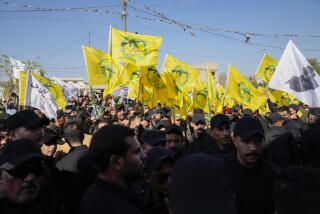Iran touts new air defenses during war games
- Share via
Reporting from Beirut — Iran’s military this week is showing off its defensive capabilities, including what it described as new air defenses, amid renewed talk of airstrikes on Iran’s nuclear sites.
Iranian military authorities said they activated radar and signal detection installations along the mountainous nation’s 4,200 miles of borders; put army, Revolutionary Guard and Basiji militia forces on alert; and launched a six-plane mock military raid by the fictional “orange forces” likely meant to mimic an Israeli or United States airstrike on its nuclear facilities.
“The radar network acts as the watchful eyes of the air defense system in all the border areas of the country and in various locations, detecting the slightest movements within the skies of the Islamic Republic, accurately monitoring them all,” Air Marshal Hamid Arzhangi, spokesman for the war games, told the semiofficial Fars News Agency.
Iran described the war games as its largest ever.
Iranian diplomats and political leaders regularly dismiss the possibility of a preemptive American or Israeli attack on Iran’s nuclear facilities or conventional armed forces, an idea that was suggested this month by Sen. Lindsey Graham (R-S.C.), a member of the Armed Services Committee and the Air Force Reserve. But Iran’s military elite, especially officers of the Revolutionary Guard who have recently emerged as a driving force of foreign and national security policy, are increasingly warning of conflict.
“Presently we are in a situation of facing threats, and our guards and the army constantly prepare themselves,” Revolutionary Guard commander Maj. Gen. Gholamali Rashid was quoted as saying by the semiofficial Iranian Students News Agency in September. “It is no exaggeration to say that we are on the verge of a possible war in the future.”
Military draftees and enlisted men have been told to be ready for confrontation. “During the early morning flag ceremony, we are repeatedly warned that we should be ready for any surprise attacks of the U.S. and the Zionist regime,” said one draftee, who serves at the Farahabad military base in Tehran and requested anonymity. “We are also told that we can demolish all of Israel in a day or so in case of any attack.”
Iranian officials this week said they tested new encrypted air-command-and-control communications equipment; a domestically built medium-range air defense system called Mersad; and new weapons, including what they described as Iranian-made shoulder-fired anti-aircraft missiles.
Tehran also claimed it was about to unveil a homemade version of a Russian air defense system, though military experts said the claim was inflated. Iran for years has been pressing Russia to sell its S-300 mobile long-range anti-aircraft rockets, but Moscow this year reneged, citing a United Nations Security Council resolution that barred sales of weapons to Iran.
Iranian officials said the war games were meant to improve air defense combat-readiness, sharpen coordination between the units via centralized command and control, assess military commanders’ performance and identify tactical weaknesses, including potential breaches in electronic security.
Iranian lawmaker Mahmoud Ahmadibigash told the state-controlled Al Alam satellite channel that his nation wanted to warn the U.S. and Israel “not to commit any stupidity because they will regret it forever.”
No independent analysts were granted access to the military exercises, which began Tuesday and are to conclude Saturday. With a budget of about $10 billion a year, or a relatively small 2.8% of the nation’s gross domestic product, Iran’s conventional armed forces have not been battle-tested since 1988, the final year of the war against Iraq. Military experts doubt that Iranian air power could repel a full attack by Western warplanes, such as the dozens of F-35 fighter jets the U.S. has agreed to sell or give Israel.
“Iran maintains very sizeable military forces,” said an unclassified Pentagon report in April. “But they would be relatively ineffective against a direct assault by well-trained, sophisticated military such as that of the United States or its allies.”
Iran’s security strategy is based foremost on deterring an attack, the report says, by increasing the costs to any nation that would cross its border and cultivating relationships with allied paramilitary and guerrilla forces in Iraq, Afghanistan, Lebanon, the Gaza Strip and Arabian Peninsula as potential retaliatory tools.
“They’re specializing in niche areas that exploit their adversaries’ weaknesses,” which include an unwillingness to take heavy casualties and a lack of knowledge of Iranian terrain, said Michael Connell, an Iran specialist at the Center for Naval Analyses in Virginia.
More to Read
Sign up for Essential California
The most important California stories and recommendations in your inbox every morning.
You may occasionally receive promotional content from the Los Angeles Times.












